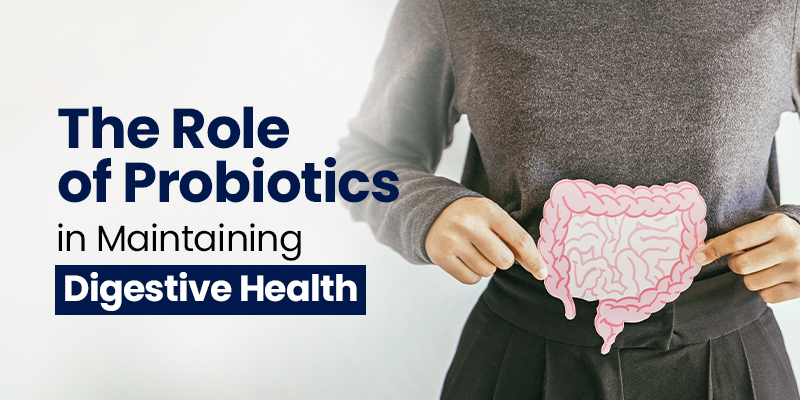- Open 24/7
- psh@paruluniversity.ac.in
- Emergency Contact - 9016668241/9016668136/18008899774

Have you ever felt bloated or sluggish after a meal and wondered why? Or maybe you’ve experienced stomach discomfort without any clear reason? Your gut plays a major role in your overall health, and the tiny bacteria living inside it have a big impact. This is where probiotics come in.
Probiotics are live bacteria and yeasts that help keep your digestive system running smoothly. The role of probiotics in digestion is crucial, as they assist in breaking down food, absorbing nutrients, and maintaining balance in the gut. While bacteria often have a bad reputation, not all of them cause harm. Some are essential for gut health, ensuring that digestion happens efficiently and contributing to overall well-being.
The digestive system is home to trillions of bacteria, both good and bad. When the balance between these bacteria is off, it can lead to digestive issues such as bloating, constipation, diarrhoea, or even more serious gut problems.
Probiotics work by increasing the number of good bacteria in the gut. They help fight off harmful bacteria, improve digestion, and support the body in breaking down food efficiently. By doing so, probiotics play a role in preventing common stomach problems and maintaining gut health.
Adding probiotics to your diet can bring a range of benefits, especially for digestion. Here are some of the key ways they help:
Probiotics can be found in both food and supplements. The best sources are natural foods that contain live bacteria. Some of these include:
If getting probiotics from food is difficult, supplements are an option. However, not all probiotic supplements are the same, so choosing the right one is important. Consulting a doctor or visiting the best gastroenterology hospital can help determine which probiotic strains are most suitable for specific digestive needs.
Knowing when and how to take probiotics can make a difference in how well they work. Here are some things to keep in mind:
Bloating and excessive gas are common digestive complaints, often caused by an imbalance of gut bacteria or difficulty in breaking down certain foods. Some foods ferment in the gut, leading to gas buildup, which can cause discomfort.
Probiotics can help by:
If bloating is a frequent issue, including natural probiotics for a healthy gut in the diet can help relieve discomfort.
Acid reflux, or heartburn, happens when stomach acid flows back into the oesophagus. This can cause a burning sensation in the chest and discomfort after eating. While there are various reasons for acid reflux, an unhealthy gut may be one of them.
Probiotics help by improving digestion and preventing excessive gas, which can contribute to acid reflux. They also support the stomach lining, reducing irritation and discomfort. Some studies suggest that probiotic strains like Lactobacillus and Bifidobacterium may help people who experience frequent acid reflux.
A strong immune system starts in the gut. Since a large portion of immune cells are located in the digestive tract, the balance of bacteria plays a key role in fighting infections.
Probiotics can support the immune system by:
Eating natural probiotics for a healthy gut, such as fermented foods, can help keep the immune system strong and reduce the risk of illnesses.
There is growing evidence that gut bacteria influence weight. Some bacteria help break down food more efficiently, while others affect how the body stores fat.
Probiotics may help with weight management by:
Some studies suggest that certain probiotic strains, such as Lactobacillus gasseri, may help reduce belly fat when combined with a healthy diet and exercise.
The gut plays a huge role in overall health, and probiotics help keep it in good condition. From improving digestion and supporting the immune system to helping with stomach disorders, probiotics are a simple and natural way to maintain digestive wellness.
Eating probiotic-rich foods, pairing them with prebiotic foods, and taking supplements when needed can make a real difference in gut health. If digestive issues persist, consulting experts at the best gastroenterology hospital can provide guidance on the right probiotics to take.
Written by Parul Sevashram Hospital | 20 November 2024

